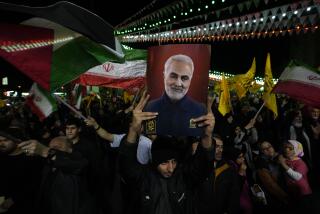EU targets Iranian elite security force in sanctions on Syria
The European Union announced sanctions Wednesday against Iran’s elite Al-Quds security force, saying it was providing Syria with materiel and other support to help Syrian President Bashar Assad crush that country’s popular uprising.
The sanctions represent the most direct international accusation that Iran is helping Syria to quell a 5-month campaign of opposition protests. There was no immediate public response from Iranian authorities to the sanctions, who have remained among Assad’s strongest allies.
The sanctions, published Wednesday in the EU’s Official Journal, accuse Iran’s Al-Quds force of “providing equipment and support to help the Syria regime suppress revolts in Syria.”
The EU sanctions will freeze assets and ban travel by certain individuals and entities.
British newspapers previously have quoted unidentified Western diplomats as accusing Iran of providing riot-control and surveillance gear to Syria to help Assad’s regime against dissidents.
The Al-Quds Force is a top unit of Iran’s Revolutionary Guards. The U.S. Defense Intelligence Agency has characterized the force as the main arm for Iran’s covert operations abroad in support of Iran’s allies, including Hezbollah.
The EU sanctions name four other Syrian agencies and 15 individuals, bringing the number of targets on the European bloc’s Syrian blacklist to more than 50.
The list released Wednesday also provides a snapshot of Western governments’ outline of some of the key actors in Syria’s crackdown.
Individuals and agencies on the list include five Syrian generals and military and civilian branches of Syria’s intelligence services.
Wednesday’s sanctions list also features Ali Douba, a former head of Syria’s military intelligence. The sanctions list cites Douba as a principal in the Syrian government’s bloody 1980 crackdown in the central city of Hama, and says Assad recalled Douba to duty to help with the current crackdown on dissent nationwide.
Knickmeyer is a special correspondent.
More to Read
Start your day right
Sign up for Essential California for news, features and recommendations from the L.A. Times and beyond in your inbox six days a week.
You may occasionally receive promotional content from the Los Angeles Times.






